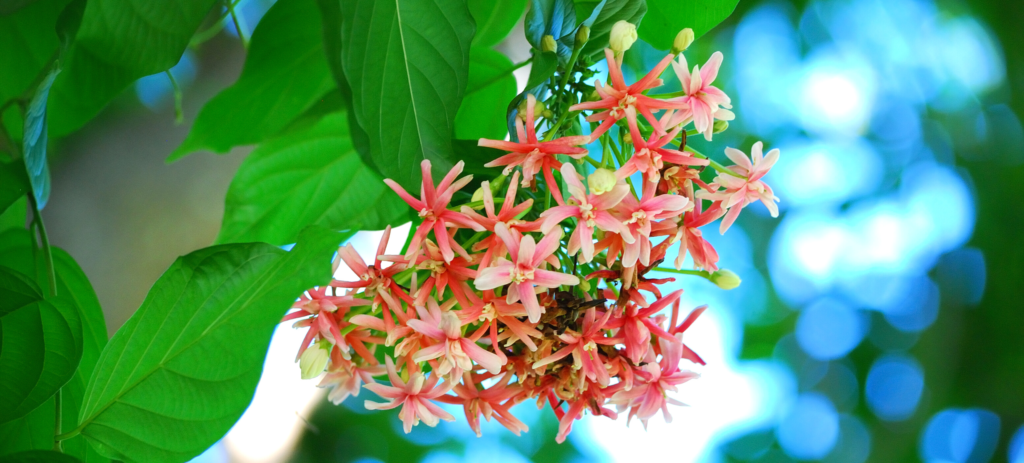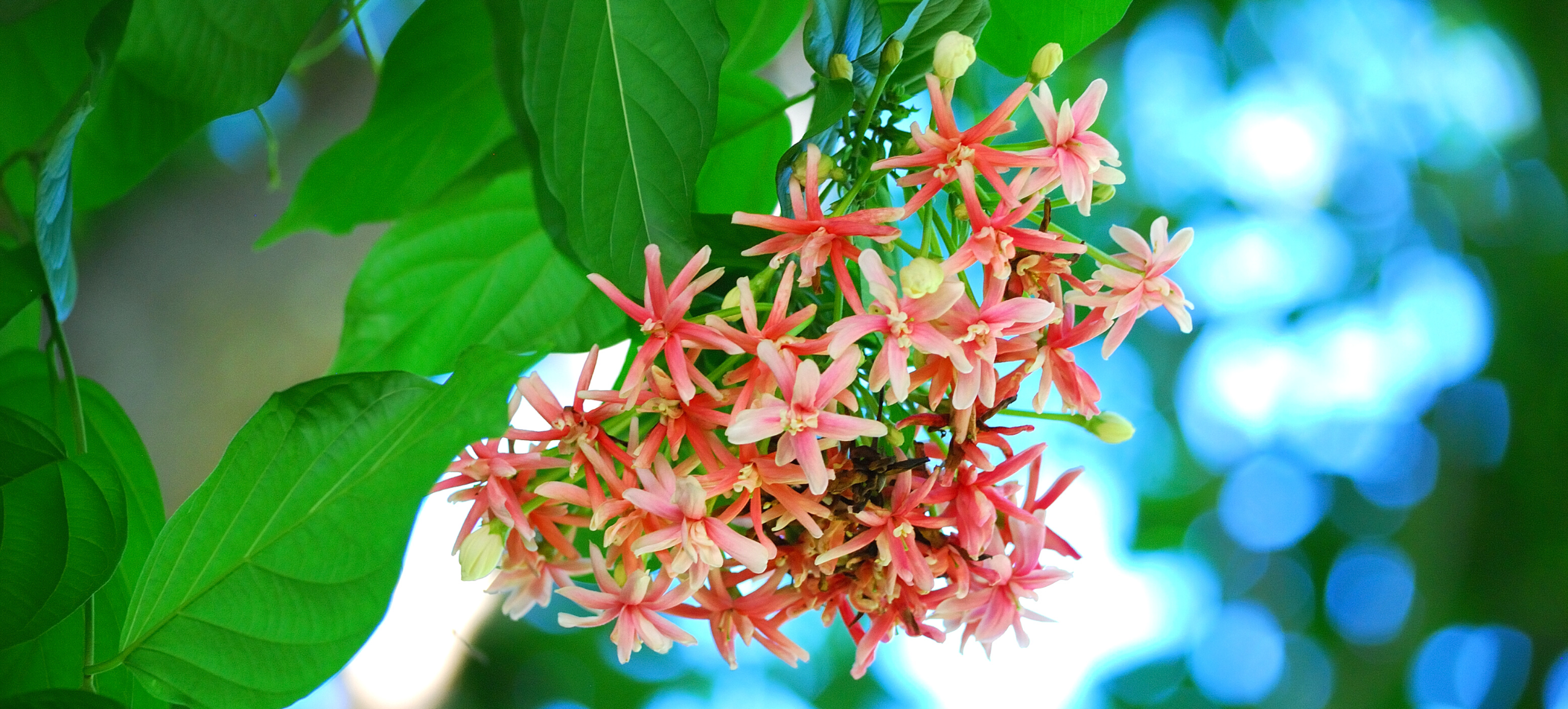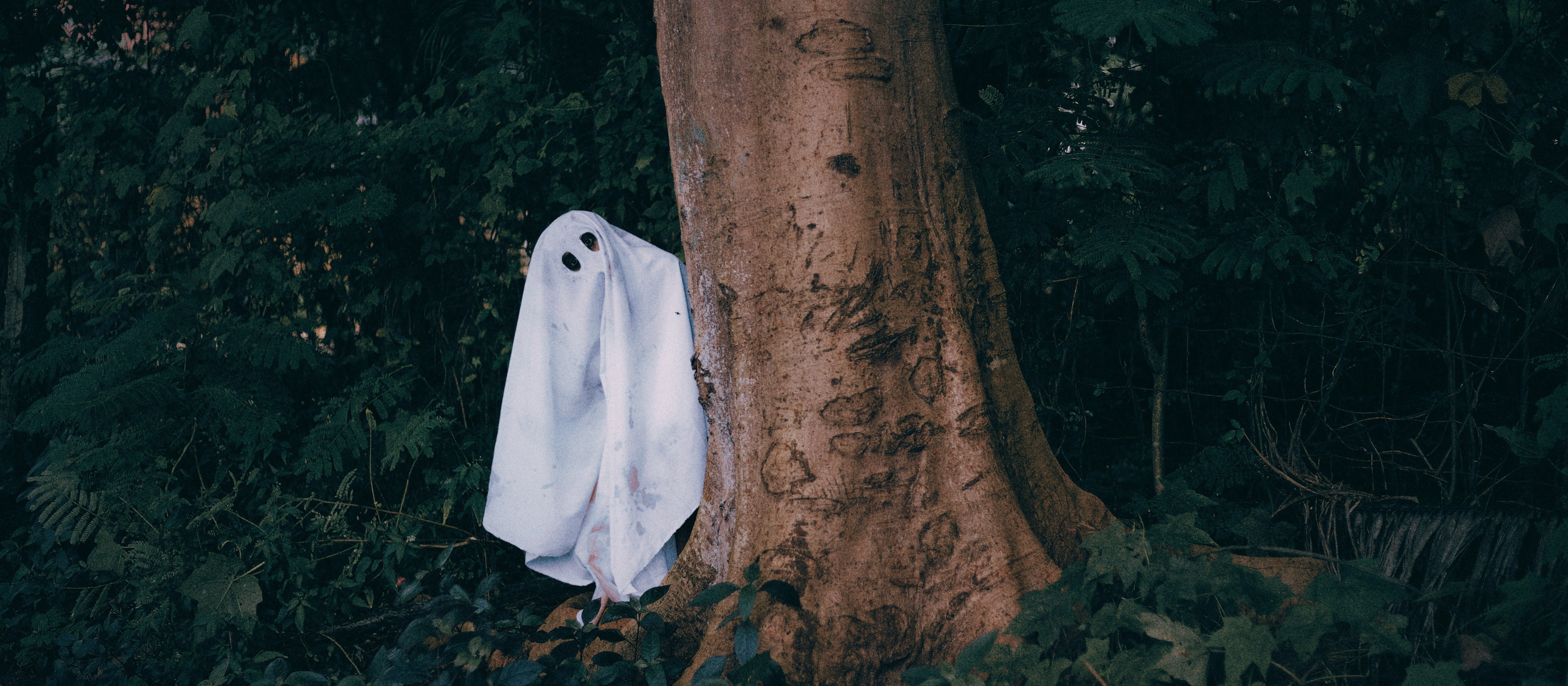By Swati Ravi Nain

It’s six in the morning and I’m punch-drunk on smell. A sunbird is performing the magic trick of thrumming to a standstill in the air, getting its shot of nectar. There is a flowering vine that has climbed in pink-and-white profusion over the edge of my balcony. Madhumalti, it is called in my tongue. Honey vine, redolent with musk, promiscuous in its wandering tendrils insinuating themselves everywhere. Its lush, sweet scent seeps into every living moment. And I find myself lost mid-sentence, dazed as I go about my day.
This is the smell of my childhood. It is a moment pressed between the pages of a book, a bittersweet verse. It hooks me raw by the heart and suspends me in the amber of a hot summer afternoon thirty years back. The sweat cooling at the nape of my neck as I watched sparrows lilt and lift across the lawn. The beeswax translucence of my mother’s wrist and the gold bangle that encircled it. That feeling, equal parts joy and terror like a runaway bicycle, that is every moment of being ten years old and in love with the world.
Until the day, I ran smack, bruised lip, bloodied nose, and injured innocence, into the invisible wall of being a second daughter in Uttar Pradesh. No brothers, they’d ask. Only two girls, they’d say and tut at my parents. And I’d puzzle over what they meant. And I’d feel myself knot into nothing. And I’d wonder why this world I loved so much, did not love me back. This is how my flower-scented hometown became my first unrequited love.
From the moment I was born a second daughter, my parents had to grit their teeth against the condolences they received instead of congratulations. In refusing to try for a son, they became less than. For my grandfather, I was a mistake. Someone who should never have been. For my aunt with her two sons, I was a pawn to be played against my mother. For the nuns at school, I was a creature to be tamed, a young lady to be seen and not heard, legs crossed lest someone see too much. I hated these pat little aphorisms that demanded I edit my body and voice. If these were the rules of being a lady, I did not want to be one. And so I was schooled in rage, longing to become my mother’s biting comeback.
At eighteen, I couldn’t wait to leave this world of Madhumaltis. For all the trees in Lucknow, I could not stand the suffocating clutch of the gossip vine, strung together with disapproving aunties and depressing uncles. No corner of the city was safe from its eye-pocked, grasping tentacles. The aunties with their whiplash rules of silence and smallness woven into braids, barbs of disapproval tucked like bobby pins into their hair, waiting to be pricked into my unsuspecting flesh. The uncles with potbellies like stop signs and eyes that said, you are no child, you are a dangerous thing to be caged and cut to size. Even at thirteen, I felt stripped, dwarfed, an outsider inside my own home. The sun-dappled walkways of my childhood had turned into minefields, startling me with groping hands and the shrapnel of shouted obscenities. Suddenly every beloved, tree-cloaked corner became an ambush lying in wait for the girl who hadn’t learned to hide in her box. How dare I walk my illicit skin into the streets past dark? As if the moment I sprouted breasts, the world switched to a language I could not speak. My desires, my sun-loved, brown body, my very being spoke a pidgin of spice and hunger that made the city curl its lip in disgust.
Lucknow demanded that I sit much like everything that made the city beautiful – its brick-arched bungalows, its white-frosted chapels, its Mayqueen balls and Kitty parties – cultured into submission, decaying in colonial splendour, formaldehyded in sepia-tinted, old-world charm. It loved the idea of the young lady. Always smiling, luminously fair, draped in virginal, white muslin with kohl-lined eyes. Silver droplets dangling from creamy lobes. Studious but not ambitious. Perfect for the marriage market.
And so I ran from the city at eighteen, peeling off the quiet spaces, the sheltering trees, my father’s quixotic poetry, and my mother’s fierce, fragile love. I dug up my roots and emptied my heart of home. I scowled, and razored off my hair, pierced my ears, and spiked steel through my tongue. I stuck my head out of bus windows in the sweltering Delhi sun to burnish and thicken my skin. I marked my neck with ink and pain, a match lit in red, a goddess of bones and found stories. I put my life into a backpack and ran. If I stayed still too long, my clay could harden into an unmoving statue of womanhood.
In my mind, I heard my mother’s panicked litany, coding the scripture of escape into my blood. If you stand before mirrors, you will become a beautiful picture and nothing else, she warned. Fill your mind or you will be making rotis for the rest of your life. Thotha chana baaje ghana, an empty seed makes too much sound, my mother whispered to me. And so I put away my voice and stuffed myself with words and ideas, afraid to be a worm-eaten, hollow shell, full of empty noise. I slogged and hustled, cracking my teeth and feeding my bones to the world. I abandoned slowness in favour of ambition. I packed away femininity as a laughable, skinless thing and shellacked on an armour of imitated machismo. I lit up warning beacons with chain-smoked cigarettes. I briskly marched past a string of men and let them know they would never own me.
And yet every night, my feet hurt and twitched, never at rest. And my skin felt parched for the yellow cluster drops of the Amaltas tree, the crimson, wide-armed hug of the Gulmohar tree, the flit of the sparrow, and always, always, the scent of the Madhumalti.
At twenty six, I met a man who did not want to own or be owned by another person. A man who did not yet have a definition of womanhood and was waiting for me to tell him what it could be. I dared to stop running. I slowed to a jog and cooled my skin. I gingerly married, moved to Mumbai, and tried to dream skyscraper dreams. I tried to like open-plan apartments slotted into the sides of identical towers. And I wondered if I could ever go back home.
Over the next fifteen years, I relearned love in a city with no trees. I began to see myself clearly in its impartial mirrored surfaces. Mumbai did not care as long as I turned its cogs and ran its treadmill streets. It asked me for nothing but sweat. In return, it told me I could make up whoever I wanted to be. I discovered that the spice of my language had a place in the world. I met many second daughters. I found that old love has no sharp edges. I began to crack open my armour. I had a child and discovered I was not my mother. I began to let my femininity out and found it had grown its own second skin, cocooned within me. I began to question whether being my mother’s comeback was a worthwhile obsession.
Over several decades of living and loving, I built a new idea of identity and belonging. The last of the hurt of being spurned by my native city, leached out of my heart. And I heard it whisper, all I ever wanted was the fragrance of flowers that is my birthright. At forty, I packed my bags, my ambitions, my seven-year-old son, and the lean, lovely man who still refused to own me, and I went in search of sparrows and smell.
I wandered until in Goa, I found a patch of soil to plant my Madhumalti, my honey vine. Here, I began to listen to the woman I had become. It took me a year to stop jogging, then to stop walking, then to learn to simply sit and gaze. To let my hair grow to curl and let colour fill my home. To stop turning every act of living into a banner of protest. To realise being a woman could be a quiet celebration. To understand that my ten-year-old self had already known what she wanted, before the world stole the truth from her.
As I waited, I learned to tell myself that my vine was growing roots underneath the darkness of the loam, even if I could not see it grow. A year later, as if it knew I had learned the lesson of slowness again, the Madhumalti shot up with shocking suddenness. Tendrils curled their way upwards, so green that I longed to bite into them. My vine lit up with fist-thick clusters of buds from toe to top. With a theatrical flourish, she draped my view with bouquets of pink-and-white flowers, with a fragrance so rich that it left me stupefied. Now every morning, she calls me to sit and plant my feet, to feel my roots grow deep, and she tells me, I am home.

Swati Ravi Nain has been writing for advertising for over fifteen years, seven of them as a freelancer. She has loved books from the moment she met Huckleberry Finn at the age of seven. Having recently won a BIPOC Scholarship from Gotham Writers Workshop, she is leaping towards the writerly life with a mix of bug-eyed optimism and quiet panic. She writes from a sunlit balcony in Goa, India where she lives with her husband, her son and several increasingly precarious piles of books.
Why we chose this piece: This essay completely transported us, and Swati’s path of self-discovery resonated with us deeply. Her writing style is vivid and pulled us in from the first sentence. Her use of the flower as a throughline is incredibly effective. This piece is just, wow. We were stunned to learn that “Madhumalti” is Swati’s first published piece.





